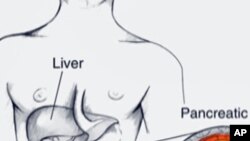Scientists in Seattle are reporting a potential breakthrough in the treatment of pancreatic cancer, a disease which stubbornly resists most therapies.
Pancreas cancer tumors are resistant to chemotherapy partly because they form a biological barrier around themselves.
Researchers at the Fred Hutchinson Cancer Research Center believe they've found a way to break that barrier down.
"Pancreas cancer actually has the highest one-year and five-year mortalities of any cancer," says Sunil Hingorani, senior author of the study published in Cancer Cell.
That high fatality rate has been something of a puzzle for researchers who study pancreatic cancer. Powerful chemotherapy drugs that kill off pancreas cancer cells in the laboratory are next to useless in living cancer patients.
Scientists have observed how tumors in the pancreas, in effect, wall themselves off with a collagen material similar to scar tissue. That exerts pressure on the blood vessels that supply the tumor, collapsing many of them and restricting not just the flow of blood but also of chemotherapy drugs.
"And so in this way, the tumor actually isolates itself completely from the circulation, and when we try to give drugs through the vein, they essentially bypass the tumor and instead go everywhere else," Hingorani says.
So the problem may not be that the chemotherapy medicine doesn't work, but that it simply may not be able to reach its target.
To find out, Hingorani and his colleagues used mice genetically engineered to stand in for human pancreatic cancer patients. They treated them with the standard chemotherapy drug, gemcitabine, plus the enzyme PEGPH20, which allows the collapsed blood vessels that supply the tumor to re-open.**
"We found that in essentially every animal that we tested, we saw the tumors shrink or at least stop growing," he said. "And we found that overall survival increased by about 70 percent - so not quite doubling, but just about."
Of course, what works on mice doesn't necessarily work on people, so the researchers are beginning human trials. Hingorani says he is optimistic, but cautions that it will be a year or two before results are available from the tests with people.
However, if all works as the researchers hope, not only would the chemotherapy be more effective, there may be fewer nasty side effects. That's because with more of the medicine actually reaching the tumor, doctors may be able to use less of the powerful chemotherapy drugs.
**A small correction was made in the ninth paragraph of this article to clarify that the enzyme/gemcitabine combination does not directly cause the tumor’s collapsed blood vessels to re-open. Instead, it triggers a degradation of the tumor barrier that lowers the fluid pressure in the region. This, in turn, allows the collapsed blood vessels to re-open and permits more chemotherapy drugs to reach the tumor.








